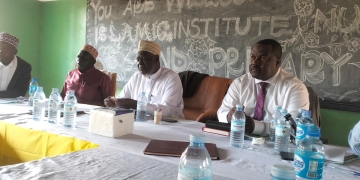
In a historic move to eradicate polio and bolster its health system, Uganda launched a comprehensive door-to-door immunization campaign aimed at vaccinating more than 8.7 million children under the age of five. Running from November 4 to November 10, 2022, the campaign marked the second phase of the nationwide rollout of the new oral polio vaccine type 2 (nOPV2). This initiative is a response to the detection of a circulating vaccine-derived poliovirus (cVDPV) in Lubigi, Kampala, in July 2021.
Led by Uganda’s Ministry of Health and supported by global partners such as the World Health Organization (WHO), UNICEF, the Centers for Disease Control and Prevention (CDC), Rotary International, and others, the campaign aligns with the Global Polio Eradication Initiative (GPEI).
A Vital Initiative for Health System Resilience
The campaign was officially launched by the Honourable Dr. Jane Ruth Aceng Ocero, Uganda’s Minister of Health, during the commemoration of World Polio Day 2022. At the event, Dr. Aceng emphasized the importance of immunization in strengthening health systems and addressing public health challenges.
The resilience of the health system depends on immunization at the community level. We are working hard, with the support of our partners, to improve the capacity of our health system, she said.
Dr. Aceng acknowledged the ongoing threats posed by health crises such as the COVID-19 pandemic, Ebola outbreaks, and the influx of refugees, which increase the vulnerability of Uganda’s population to preventable diseases like polio. The Ministry of Health remains committed to taking all necessary steps to ensure that every child receives routine immunization services, including polio vaccination, she added.
A Collaborative Approach to Eradicating Polio
Dr. Samuel Bawa, Uganda’s GPEI Coordinator, commended the Ministry of Health for its efforts and reiterated the importance of a robust public health infrastructure. Achieving a polio-free world requires a strong public health system capable of responding to threats and emergencies. Uganda’s efforts are an example of the dedication needed to protect children and build healthier communities, Dr. Bawa said.
This campaign builds on the success of the initial nOPV2 rollout in January 2022, which vaccinated nearly 9.8 million children—111.1 percent of the targeted population. Such success highlights Uganda’s commitment to tackling polio through rigorous planning and community engagement.
A Massive Undertaking
The November 2022 campaign deployed approximately 72,000 immunization teams, consisting of health workers, Village Health Teams (VHTs), and Local Council Representatives (LC1s). These teams operated door-to-door to ensure no child was left behind, focusing on hard-to-reach and vulnerable communities.
Each team was equipped to administer the nOPV2 vaccine, share key household messages on Ebola prevention and community-based case definitions for early disease detection, and build trust in vaccination campaigns through interpersonal communication and education.
The campaign also addressed vaccine hesitancy, fueled largely by misinformation spread through social media platforms. Dr. Aceng appealed to all stakeholders to intensify efforts to combat misinformation, which undermines public health initiatives.
Why the New Oral Polio Vaccine Matters
The nOPV2 is a next-generation oral polio vaccine designed to better prevent vaccine-derived poliovirus outbreaks, which can occur when the weakened virus used in traditional vaccines mutates and spreads in under-immunized communities. The introduction of nOPV2 represents a scientific and strategic advance in Uganda’s fight against polio.
This campaign is not just about preventing polio but about building a healthier and more resilient population, Dr. Aceng said.
Challenges and Strategic Interventions
Uganda’s immunization campaign faced several challenges, including population movement due to refugees and internal displacement caused by regional conflicts, misinformation undermining vaccine acceptance, and health system strain from the COVID-19 pandemic and Ebola outbreaks.
To address these issues, the Ministry of Health leveraged partnerships with global organizations, trained immunization teams extensively, and prioritized community engagement.
A Comprehensive Approach to Public Health
Uganda’s polio eradication efforts are part of a broader public health strategy. The Ministry of Health’s five-year strategic plan for immunization emphasizes improving vaccine delivery to reach every eligible child, promoting the importance of immunization to reduce vaccine hesitancy, and strengthening health infrastructure to enhance the capacity of health workers and facilities to respond to public health challenges.
By linking immunization campaigns with other health interventions, such as Ebola prevention education, the Ministry is maximizing the impact of its resources.
The Road Ahead
While Uganda has made significant strides, achieving a polio-free status requires sustained commitment. The Ministry of Health plans to build on the momentum of the nOPV2 campaign by expanding routine immunization services, increasing collaboration with global and regional partners to align with the WHO’s Polio Endgame Strategy, and hosting workshops and training sessions to equip health workers with the skills needed to tackle vaccine hesitancy and other barriers.
Conclusion A Nation United Against Polio
Uganda’s nationwide polio vaccination campaign underscores the power of collective action in tackling public health challenges. By reaching over 8.7 million children and addressing the root causes of vaccine hesitancy, the Ministry of Health is laying the foundation for a healthier, more resilient future.
As Dr. Aceng aptly stated, Immunization is an important aspect of health system strengthening. Together, we can ensure that every child, no matter where they are, has access to life-saving vaccines.
Uganda’s commitment to eradicating polio is not only a testament to the nation’s resolve but also a beacon of hope for a polio-free world.









